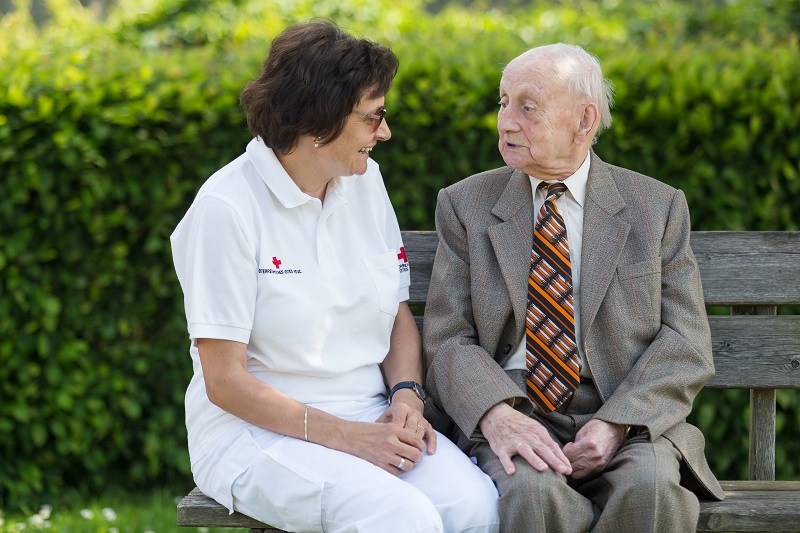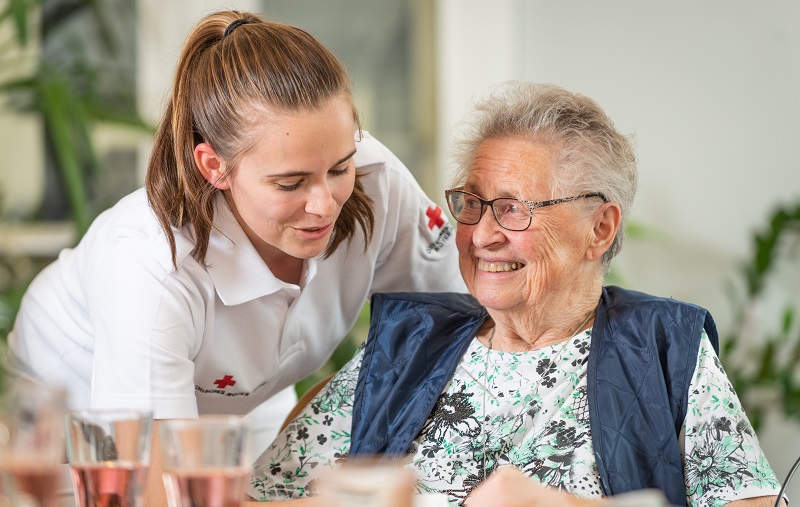Health and social care as a human right
Amid an ageing European population, the Red Cross works to promote access to care services for older people, responding to the challenges faced by the European Union and Member States, whilst also highlighting the work of informal carers.
We talked with Anya Blum, manager of the Innovative Community Care Centres (I-CCC) project, to learn about the Austrian Red Cross’ work promoting long-term care in Austria and beyond.
The Red Cross works to respond to the needs of people in vulnerable situations. Could you explain who these people are in your area of work and the major issues they experience?
We strive to ensure a healthy and safe living environment for older people in need of care and their informal carers. The Austrian Red Cross, in its auxiliary role to the Austrian government, is one of the main providers of health and social services in Austria. We offer services such as: home care, nursing homes, day care centres, tele-alarm systems, meals on wheels, counseling and advice, psychological support, social activities and respite services. The people we work with are mainly older people and people with support needs, and their informal carers, such as family members or friends.
Older people can struggle with daily tasks, such as caring for their personal hygiene, getting dressed, going to the toilet, moving about, eating, taking their medicines, grocery shopping and cleaning the house. In some cases, they face financial shortages. They can also suffer social isolation and loneliness, as they often live alone and cannot participate in social activities. Often, older people simply need someone to “check in” on them. On the other hand, their informal carers, such as family members or friends, can get overwhelmed with their caring obligations. We support them through training, for example on dementia, stroke, first aid, older people’s rights, violence prevention, self-help groups, respite services and social activities. We also offer counselling and advice, for example, about where they can access financial support.

What is the Austrian Red Cross’ approach for healthy ageing and long-term care?
At the Austrian Red Cross, we believe that healthy ageing requires that our mental and physical capacities are maintained and supported by our environment. Therefore, we provide services that allow people to stay at home as long as possible, keep them mentally and physical active and offer social activities to them. Within the I-CCC project, we established 6 community care centres in Austria, Montenegro and Serbia, providing healthy ageing services. For example: sports activities, lectures on healthy food, creative workshops, a tablet-based training for people suffering from dementia and/or cognitive impairments, self-help groups, respite services, home help, and assisted vacations.
Can you tell us more about the activities that the Austrian Red Cross implements for healthy ageing and long-term care?
In Austria, we have around 15,000 volunteers engaged in health and social services who carry out the activities I already mentioned, and others such as a senior club. We also have around 2,300 health care workers and nine nursing homes in Salzburg.
We are using our knowledge to support other National Red Cross and Red Crescent Societies in this area. Apart from the I-CCC project, in collaboration with the Red Cross of Serbia, we are running projects aiming at advocating for the rights of older people and their informal carers, including violence prevention. Advocating for the development of and access to high quality, person-centred sustainable services is important to improve the quality of life of older people and thus their healthy aging, as well as the wellbeing of the people who care for them on an informal basis.
We are also collaborating with the Armenian Red Cross to build the Gyumri Care Centre offering high quality health care and social services. In Ukraine, we are planning to adapt the I-CCC concept, using a user-centred approach.

In 2022, the European Commission launched the European Care Strategy. Considering the results and lessons learned from the I-CCC project, what is essential to be included in the implementation of this strategy and how can health and social actors like the Red Cross contribute?
The Red Cross has extensive experience in developing community-based programmes to support older people and their informal carers, and to promote healthy ageing in different cultural contexts. We can contribute by sharing lessons learned and evidence-based data form the programmes and projects we are implementing. For example, the I-CC project has produced several materials (available in the website) that can be relevant for different stakeholders at national and European levels.
One of the main lessons learned from the project is that older people and their informal carers, which are mostly women, face specific vulnerabilities and economic disadvantaged situations. They often do not get the support they need to perform their daily activities, such as daily hygiene tasks. Some have limited access to healthy food, or are not able to get out of the bed without help. In many countries, informal carers are not recognised and cannot access grants or the support they need either. We must ensure universal access to health and social care. It should be seen as a human right, as it is essential to human dignity.
More information about the I-CCC project (Innovative Community Care Centres) here.
For media inquiries, please contact Eva Oyón on: eva.oyon@redcross.eu or +32 2 235 09 22

